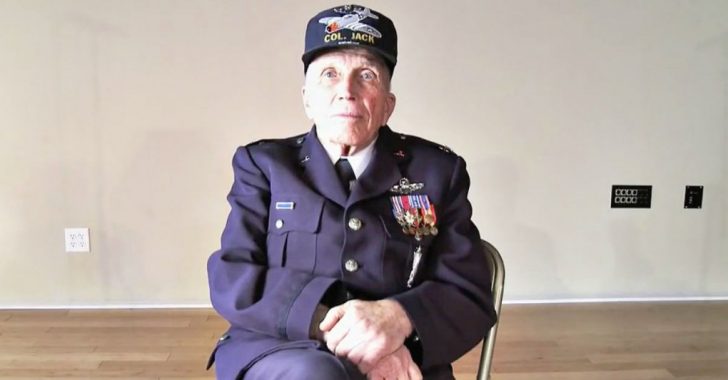How The Power Of Music Shaped, Saved The Life Of ‘Col. Jack’

The power of music has guided Col. Jack Tueller through 95 years of life. Though Tueller says his lips aren’t quite as they used to be, he still loves to belt out a tune on his beloved trumpet — something he’s done since he was a small boy.
“I held my mother’s hand when she died,” said Tueller. “I was 5 years old. I turned to look for my dad, and he left his family. So, I was a lonely little boy; very angry.” Tueller’s aunt tried to raise him, but he said he “tore all the shingles off the roof, broke all the dishes in the house. I was the Tasmanian devil. So she went downstairs and found a trumpet.”
The power of music tamed that tormented child. He became an award-winning musician, and his skills landed him a job playing at the Lake Hotel at Yellowstone National Park.
As the clouds of war grew, Tueller couldn’t ignore the storm. He enlisted at Fort Douglas, put down his trumpet and pursued another one of his great passions: the love of flight. He landed in the cockpits of fighter planes, soaring over Europe in an unbelievable 144 combat missions.
He credits his survival to his love of hugging the ground.
“Never got over 10 feet off the ground in attacking ground targets,” said Tueller. “Below the trees, they didn’t see me coming. I had two 1,000 pound bombs, 10 rockets and eight .50 calibers. And I let it all go. They didn’t see me coming, they didn’t see where I went. So I didn’t ever get hit.”
On those missions, deep behind enemy lines, he kept a constant companion.
“The trumpet was in a little canvas bag, attached to my parachute,” said Tueller. “I figured if I ever got shot down, and I bailed out, I could play for the guard in the prison and get an extra bar of soap for the shower.”
The following night, Tueller was flying missions out of a makeshift airfield in northern France. On the ground, German snipers killed 28 Army engineers, and one sniper remained, completely hidden in darkness.
The power of music, Tueller said, saved his life.
“I thought, ‘How do I stop him?’ And the impression came to me, ‘Well, play his love song.’ So I played ‘Lili Marleen,’ made famous in 1938 by Marlene Dietrich. And I played that song, and he didn’t fire.”
The next morning, Tueller was told a prisoner kept asking who’d played that trumpet. A jeep drove him to Omaha Beach, where POWs were awaiting transport to England, and he looked the sniper in the eye.
“He was 19 years old, and he was just scared and lonely and crying, and he saw my trumpet, and he knew,” said Tueller. “And he said, ‘When you played last night, that was the love song that my fiancee and I are going to get married to. And that song reminded me of her.’ So he stuck his hand through the barbed wire, and I shook the hand of the enemy. He was no enemy; he was a scared kid like me.”



What are your thoughts?